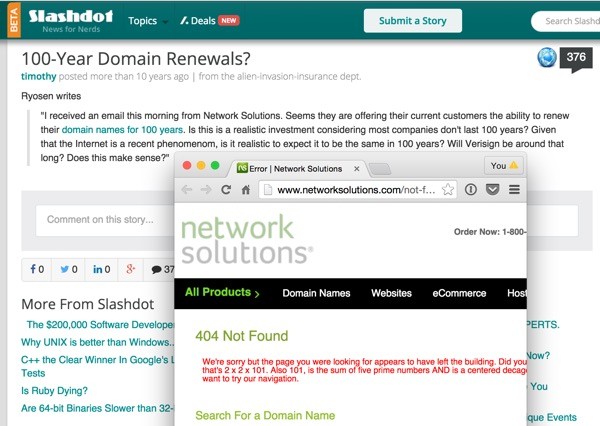
Update: I first pitched this series to Tuts+ because I thought it was an interesting, under-reported topic. After completing the first two episodes, I learned that I had a treatable, operable, likely benign brain tumor which will require surgery. My prognosis is very good but those first few days were intermittently terrifying and poignant — the topics explored in this series became very real to me overnight. I hope you'll take my experience to heart, read mindfully and consider taking action to preserve your digital legacy (next week's topic). Please also check out my personal essay: What We Can Learn From My Brain Tumor. Enjoy the series.
This is the first of a series on exploring the complexity of managing your digital legacy. In this episode, I'll share with you what I learned researching how to host my WordPress site for a hundred years.
What Happens to Your Website When You Die?
In 2010, Jeffrey Zeldman, publisher of A List Apart, wrote about the topic of Posthumous Hosting and Digital Culture. Two colleagues (likely friends) of Zeldman's had passed away and one of their sites had disappeared, in part due to the wishes of the family.
Commenters found links to one of the sites in the Library of Congress's September 11th archives. The other colleague's site remains hosted, six years later (presumably by family).
Said Zeldman:
Unlike with other digital expressions, format is not the problem: HTML, CSS, and backward-compatible web browsers will be with us forever. The problem is, authors pay for their own hosting.

Note: While my initial view of the Library of Congress was successful, subsequent lookups failed. The question is perhaps not who do you call for support but who's gonna call? (Since you're dead.)
It's Personal For Me Too
Over the past few years, one of my writing instructors and a photography teacher both passed away—and both their sites are gone. Here's my photography instructor's site today:

Not only was he one of the most fun, inspiring instructors I've ever had, he was also an amazing photographer.
And here's my writing instructor's site today—she spent years working in Japan, but that's not a translated version. It's a domain squatter.

You can still read her articles that were published on other sites, like this feature she did on living with cancer for Seattle Weekly, Running With Fear. She described her online writing as "[her] memorial, what will remain when I am gone."
Her site ran on TypePad. I had helped her set it up many years ago. Her family has intentionally let the site go for now. I'm hopeful they'll change their minds and reinstate it one day.
People receiving cancer diagnoses who in the past might have found her blog an encouraging resource won't likely know it ever existed. I'm saddened by this and I believe that she would be as well.
You can find parts of both of their blogs in the Internet Archive's Wayback Machine, but Google doesn't index the Wayback Machine. In other words, people searching on public search engines won't see results archived there.
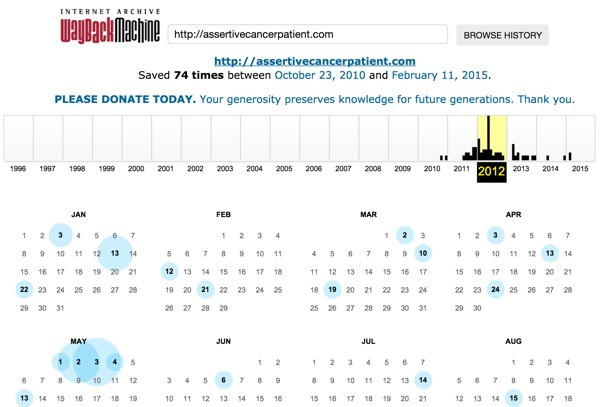
And the Wayback Machine is often plagued by broken pages, images and links:
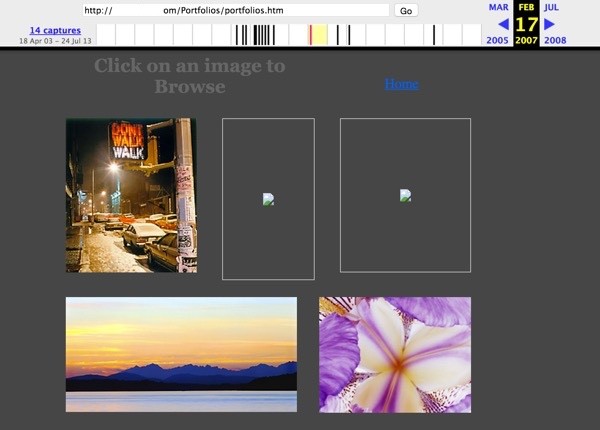
Zeldman wrote, "The death of the good in the jaws of time is not limited to internet publications, of course. Film decays, books (even really good ones) constantly go out of print, digital formats perish." Ironically, he used a bit.ly URL shortener to link to that really good out of print book for sale on Amazon with his associate (affiliate) tag. After he passes on, what happens to the quality of outbound links on his site if bit.ly shuts down? Who will receive the revenue from all of his Amazon referrals?
I've Failed
All of my Tuts+ tutorials thus far have had successful endings... until now. Every tutorial I've published here has always succeeded in guiding readers through the process of performing some task or lesson. However, this time I've failed. This is the first time I set out to write a tutorial to describe how to do something and hit a brick wall.
I hope you find this journey as interesting as I did nonetheless.
It turns out hosting WordPress (or any website) after your death has a variety of unexpected complexities. There is no easy, reliable solution available to address this problem. It's a gaping hole that we as technologists should start thinking more about—especially because all of us are going to die, some of us unexpectedly sooner than we'd like or planned for.
The Technical Challenges of Immortality
Humans are obsessed with immortality. If we're not searching for the fountain of youth, we're paying companies to chop off our heads when we die and freeze them in the hopes of being brought back to life with future science.
Growing up, I remember my family talking about my grandfather being buried in a hermetically sealed coffin, the idea being that it would preserve his body forever. It turns out, the opposite is true. "In fact, a casket that is hermetically sealed increases the rate of body decomposition."
The Federal Trade Commission has a Funeral Rule which seeks to protect grieving consumers from being taken by unscrupulous burial providers (as perhaps my family was):
No casket, regardless of its qualities or cost, will preserve a body forever. Metal caskets frequently are described as "gasketed," "protective" or "sealer" caskets. These terms mean that the casket has a rubber gasket or some other feature that is designed to delay the penetration of water into the casket and prevent rust. The Funeral Rule forbids claims that these features help preserve the remains indefinitely because they don't. They just add to the cost of the casket.
(Ironically, my grandfather made his fortune selling manufactured hardware parts.)
But what are the technical challenges of hosting your website forever? It can't be that hard, right?
To start, let's look at some examples of people trying to host their website for the next hundred years—while they're still alive.
Running Your Website for a Hundred Years
Purchasing Lifetime Hosting
Let's say, for example, that you recently won a lifetime of WordPress hosting from WPEngine as part of a contest:

WPEngine is a reputable, successful company. You're probably pretty excited. But you may want to keep reading. It turns out that even purchasing hosting for the rest of your life has turned out to be pretty hard.
For example, a friend of mine once purchased lifetime hosting for $199 from a company called TextDrive which was later acquired by Joyent, and somewhere along the way the companies decided to shut down their service, then restart it, then shut it down again.
Or perhaps you jumped on WPMU's article in 2012 announcing Nodeki's lifetime WordPress hosting, "starts at just $39.00":
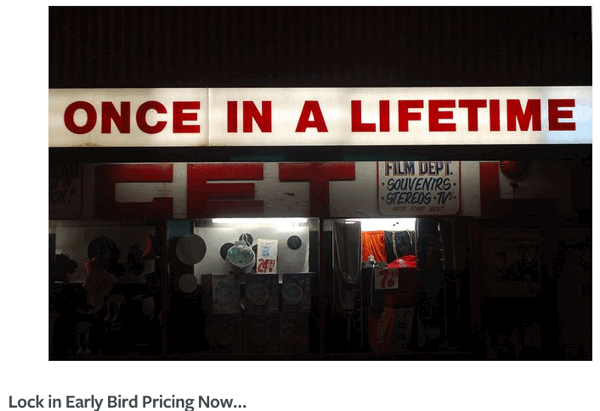
Power users could buy even higher priced plans:

The service was dead by January 2014. That's a pretty short lifetime. There were no refunds. In their email to presumably still living customers, Nodeki seemed to have sorted out some key shortcomings in their business model:
Unfortunately, the “Lifetime” plans were not a sustainable business model. We can’t continue paying for servers, software, bandwidth and support if there’s no incoming money to cover these costs. It’s not remotely possible to provide any product “for life” that has recurring costs associated with it.
And then they brought up that new owner point—apparently the folks running Nodeki were not the same ones from whom you'd bought your lifetime plan:
The Lifetime plans were not something that the existing management implemented, sold, or received money for. Due to this reason and the “no refund” policy at purchase, we are not able to offer refunds. This is not something that is open to debate.
In fact, the whole sale may have been fraud.
So any time a company offers you a lifetime of hosting or say, a hundred years of domain registration, take note. What if they hit rough roads? How reliable will their successors be? Will they remain committed to their "free-riding" elderly or dead customers? Signs point to no.
Domain Registration
Case in point, the maximum domain name renewal is ten years; however, Network Solutions will sell you 100 years of domain name renewals for only $999. Every decade, they'll ensure your domain is renewed. Sounds pretty good, right?
Unfortunately, the original link to Network Solution's 100 year offer page no longer works:

That doesn't exactly inspire confidence. However, the company still offers the service:
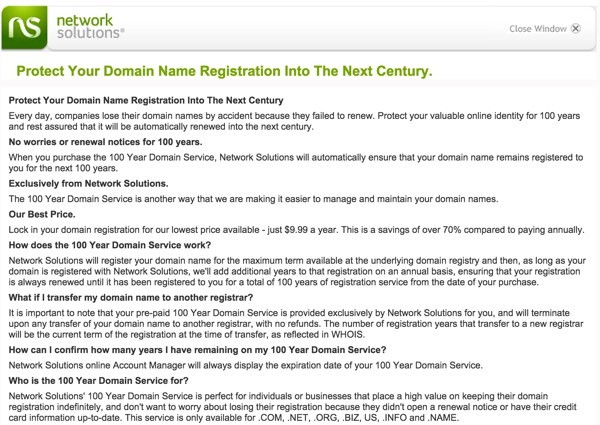
I've always thought of Network Solutions as the most overpriced domain registrar, so I'm personally tempted to renew a domain with them for only $9.99—even if I have to do it 100 times to get the discount.
Can you rely on Network Solutions to stick around 90 more years? Who knows?
So, if you have the money to invest, it looks like you can possibly keep your domain name as long as your registrar stayed in business. If you're a cancer blogger with a terminal diagnosis, that's not super reassuring.
This is also a social justice issue. What sort of low income activist blogger can spend $1,000 for a hundred years of domain registration?
Hosting
I reached out to WordPress and WPEngine to inquire if they offered any kind of posthumous hosting plans. I did not receive a reply from Automattic, WordPress's parent company. The nice folks at WPEngine said they do not currently offer a service like this.
Most web services use recurring credit card billing:
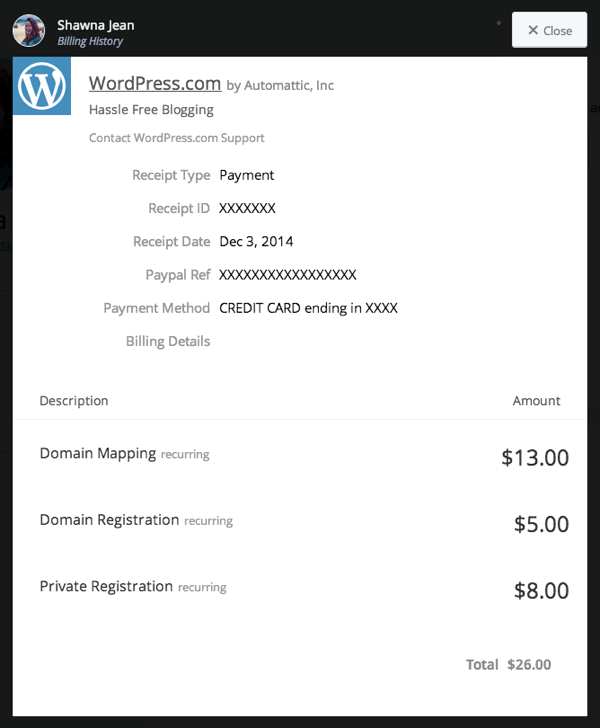
Once you die, your credit cards stop being paid or are terminated by your family. Then, your hosting bill isn't paid and your sites get shut down.
Theoretically, you could use a free WordPress.com blog, but then you have to host your site as a subdomain of wordpress.com such as hopemybloglastsforeverat.wordpress.com. Even if you make that compromise, can you trust that Automattic will still be here in a hundred years? Again, there's no guarantee.
Self-Hosting Complexities
I'm a proponent of self-hosting vs. managed hosting. It's more affordable and less restrictive. I self-host a number of my own sites for much less than it would cost me with managed hosts. I also offer guides to people to self-host optimized versions of WordPress. But I can never go on vacation again because there would be no one to keep my website up. I'm only half joking—that's why it's important to stay friends with a few fellow nerds who will help you out.
However, you definitely can't die because then no one will be able to maintain, fix or migrate your website over time.
Self-hosting makes hosting your website after death even harder.
For example, there are increased complexities and dependencies.
You might have read my tutorial on KeyCDN. KeyCDN allows you to pre-purchase credits, so theoretically I could purchase all the credits I need for long after my death. Of course, I can only purchase as much credit as my credit card company lets me.

The folks at KeyCDN are pretty nice. They'd likely take a check. But, can we rely on them being around in a hundred years? If not, there go your stylesheets, scripts and images.
System Administration
Let's imagine the nice folks at New Relic would also let me pay my Synthetics account ahead by check. Who's going to respond to site alerts? Can you imagine finding a system administration company that would still be around a hundred years from now? How much would it cost to retain them? Over time, what priority would your business be to them? You're certainly not in a position to switch if their service declines.
That's the New Relic Synthetics mascot on the left and Wall-E on the right. There's definitely a resemblance. Perhaps one of them would be willing to manage your sites for you after you've gone?

Blogging Platforms
Which brings us to the other blogging platforms: Tumblr, Medium, Blogger, LiveJournal, etc. Maybe if you write at Blogger, Google will make sure that your content stays up.
Should you be using Blogger? I was quite surprised the other day to see that my old test blogs at Blogger were still up after ten years, impressive in Internet time:

And, it's Google, right? What could go wrong? Well, according to Zach Epstein, "a statistical analysis of Google’s track record has found that more than one out of every three services Google launches ends up being shut down." Whatever you do, do not read the actual study; it's so lengthy and comprehensive you might die before you finish reading it (don't say I didn't warn you).
Don't believe this? How are your Google Reader newsfeeds doing these days? What about your Waves?
Sadly, David Carr recently passed away and his articles are still up at Medium and The New York Times. Medium founder Ev Williams has even more money (from Twitter) than Times publisher Arthur Sulzberger Jr. Surely, these are safe places to post your content for a hundred years of free hosting. Or not.
Again, if you host your content at these services, your control is reduced and your publishing flexibility is limited. If you self-host like me, you probably dislike the idea. I even recently wrote a piece to show people how to self-host WordPress with Medium-like themes.
Reposting Important Content
It's not a bad idea to repost important content that you'd like to see preserved in several places. My Medium post on relationship cutoff receives a lot of traffic there, but I also self-host it at the site I mentioned in the WordPressium tutorial, Breakups.io.
You can also request that the Internet Archive preserve important posts from your site by submitting URLs here:
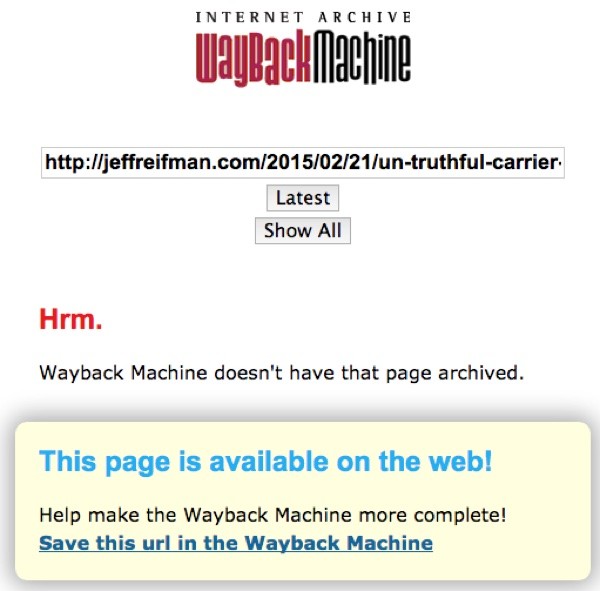
Keep in mind, Google search doesn't index the Wayback Machine archive currently, so someone has to purposefully look for your website in its archives.
It would be very cool if Google chose to integrate with the Wayback Machine archives in the future and offer a "Wayback Cache" option which was easily accessible during common searches.
Posting to Facebook
You could also post to Facebook. But, if Facebook's growth slows, there will "soon" be more dead people on the social network than living ones:

And Facebook content is also not searchable by Google, is subject to its censorship rules, and serves only to enrich its shareholders. As a self-hoster, I can't stomach it.
Many Other Issues As Well
There are a myriad of other issues to consider as well. Given that there are emulators for TRS-80s and pretty much every other old computer and arcade game you can imagine, I agree with Zeldman that technology will still be able to read your website in the future—if it's hosted somewhere.
But if you're using a shortcut URL or hosting your own, a lot may be broken. If none of your other dead friends manage to host their blogs, then where will your site link to? What about the income generation from your website? Will it sit in Amazon and Google's coffers until the end of time?
Perhaps AWS could offer a service to convert the dead's WordPress blogs into static S3 sites keeping the revenue to cover their maintenance costs. It's just an idea. For that matter, we could instruct our descendants to ship tarballs of our websites on USB drives to be placed in a cave deep underground.
The Solution?
Ultimately, it seems that you need to entrust your site to your descendants; they or you may need to hire a service to keep your site running as you wish it to be seen. It's unclear if this can be done affordably or in perpetuity. Can you trust that the service provider you choose will have integrity and stay in business? It's speculative. Can you trust your descendants?
Keeping your website active is probably the last thing your family will wish to focus on in their grief. As they move on, attending to your digital affairs may not be high on their task list.
At the end of his article, Zeldman suggests this topic is ripe for entrepreneurs:
A suggestion for a business. Sooner or later, some hosting company is going to figure out that it can provide a service and make a killing (as it were) by offering ten-, twenty-, and hundred-year packets of posthumous hosting. A hundred years is not eternity, but you are not Shakespeare, and it’s a start.
Google and other Internet leaders can also do more to show leadership in this space. Perhaps as they get older, they will think about this topic more.
In 2014, Zeldman wrote about Eric Meyer's daughter Rebecca tragically passing away from cancer. Meyer's writings about her were heartbreaking. Rebecca's favorite color was #663399 purple and now Rebecca Purple is part of the CSS standard. "She was six years, eleven and a half hours old" when she died, and she's already achieved greater digital immortality than most of us will likely see.
Perhaps rather than hold on to our digital legacy, we need to learn to let go gracefully. That's primarily what I've learned from yoga, in which every practice closes with a meditation on death called savasana.
Where Do We Go From Here?
In the next episode, I'll explore other aspects of planning for our death to make it easier for your family to honor your wishes and to make the handing over of important digital assets as graceful as possible.
I'd love to hear your thoughts on the topic of hosting after death. What did I miss? Please join the discussion below. I do my best to participate. If you have an idea, question or suggestion, please share it with the class. Or you can email me at my Lookahead Consulting website.
If you'd like to know when the next article arrives, follow me @reifman on Twitter or check my instructor page. My instructor page will include all the articles from this series as soon as they are published.


Comments